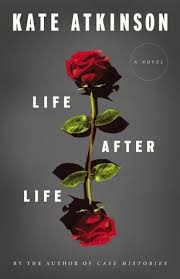I was really looking forward to reading ‘Life after Life’ by Kate Atkinson. The concept of fate, destiny and dreams is explored through the character of Ursula, and her ‘re-writing’ of history. She repeats the process of certain aspects of her life and makes changes to try and improve the lives of herself and her family. Interestingly, one of the reviews says, ‘If you enjoyed ‘The Time Traveller’s Wife, you’ll enjoy this’ – I recognised the cleverness of the concept of ‘The Time Traveller’s Wife’, but the holes in the narrative due to the time travelling element left me irritated, and unfortunately I feel the same about ‘Life After Life’.
I have read all of Atkinson’s novels, including the Jackson Brodie private detective series, and she can usually be relied upon to create a great story and a compelling narrative. This novel has been lauded as her entering into another level of literature, and becoming a stronger literary force, and I can understand why she feels tempted and flattered by this. Nevertheless, I personally feel that I would have actually enjoyed the novel as a reader – as opposed to a literary critic- if she had maintained a straightforward narrative, but explored character. I felt cheated not truly getting to know Sylvie, or Izzie, and they could have had strong narratives alongside Ursula – and Pamela too, as the voice of reason.
On reading the author’s notes, I shared Atkinson’s family’s observations on her obsession with Eva Braun – a bemusing reference to to Hitler that was borderline fantasy, and the least enjoyable aspect of a not very enjoyable novel. The German narrative was the oddest, and by far the least convincing. Although I appreciate Atkinson’s sentiment that she wanted to explore how terrible the experiences were for the Germans too, on reflection, I feel the story of Izzie’s child brought up in Germany could have provided us with a more compelling and convincing narrative than some bizarre encounters Ursula had with Hitler.
In the reviews Atkinson is applauded becase of her description of the Blitz, but the ‘reality’ of the Blitz is undermined by the ‘fantasy’ of the changes, and to me this lessens the impact of the narrative. I much prefer Sarah Waters’ descriptions of the Blitz in ‘The Night Watch’, a series of brilliant descriptions of the ambulance service during World War two. Waters also adds the angle of lesbian relationshiops, women’s changing roles, back street abortions and death, love and loss in an inventive and captivating narrative.
In ‘Small Island’ by Andea Levy, Levy also includes references to the terrible impact of the Blitz. Through her angle of Jamaican immigration, and racial prejudice she beautifully creates four distinctive main characters adds to war and death and loss – and he uses coincidence as exposition. I prefer this approach in contrast to Atkinson’s blatant use of fantasy to shift the narrative. As an emotional experience, I remember actually crying at the end of ‘Small Island’, and when I was teaching the ending to my AS Literature group, feeling a bit teary, and one of the boys telling me to ‘Get grip Miss’ – as only 17 year olds can say witout meaning any offence! Another issue for me personally is one of class. I could empathise with Hortense and Queenie and their terrible living conditions and the judgemental society they lived in. In contrast, I have limited sympathy for Pammy not passing her Cambridge exams, and then having to encounter the social humiliation of having to live in a four bedroomed house instead of a mansion with land and its own wood. The grit of Queenie, and the delusions of Hortense are of a great deal more interest to me personally.
Ultimately, for me it was the emotional engagement that was the problem. As a reader you couldn’t get emotionally involved because you knew the plot would be changing anyway, and therefore it hadn’t ‘really’ happened, so why bother to care? Although I can appreciate why Atkinson wants critical acclaim – if I were her I would stick with what she is good at!
@goodreads
You need to get onto Twitter and follow @goodreads – it is a great site with a whole host of reviewers, and much more accurate than Amazon because it isn’t selling anything! Interestingly, the reviewers for ‘Life after Life’ either loved or hated it! I loved ‘The Goldfinch’, and on their reviews people either loved or hated that too. This is the brilliance of literature, it has the power to provoke such strong thoughts, and I believe most importantly, strong emotions.
‘War and Peace’
I have always enjoyed novels steeped in history, and I can trace this back to reading ‘When Hitler Stole Pink Rabbit’ by Judith Kerr when I was a child. I also totally loved Tolstoy’s ‘War and Peace’ – still the ultimate master class in writing about the impact of war and conflict. If you have the time and the will to immerse yourself, BBC Radio 4 have wiped their New Year’s Day schedule and from 9.00am they are broadcasting Tolstoy’s ‘War and Peace’, a chronicle of three Russian families living through the Napoleonic wars. I know it is a cliché to say that ‘War and Peace’ is your favourite novel, but it is a truly magnificent read. If you haven’t got the time to read it, listen to the broadcast, or use BBC iPlayer and listen in segments, you won’t be disappointed!

